Last Updated: April 12, 2024
Taking a ferry to cross Costa Rica’s wide Gulf of Nicoya is a fun way to break up a long drive. In this article, we’ll tell you everything you need to know about using the Puntarenas-Naranjo ferry. We’ll include how to buy tickets, boarding the ferry with your car, and what to expect once you are on the boat.
We will also cover how this ferry has become important due to the temporary closure of a major bridge that connects San Jose and the central Pacific coast to Guanacaste.
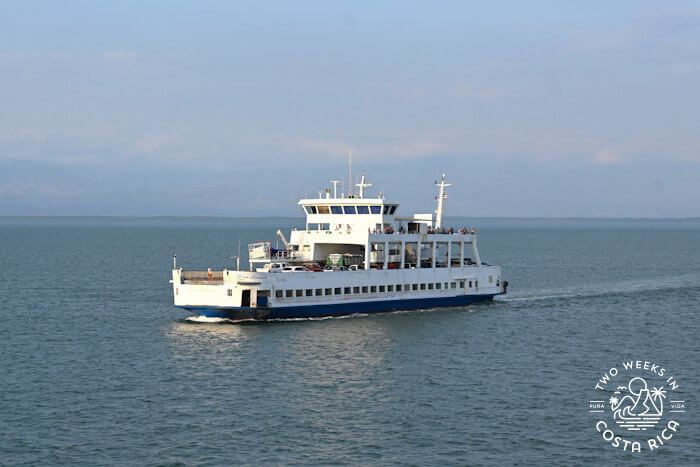
About the Puntarenas-Naranjo Ferry
There are two passenger/car ferries that connect the port city of Puntarenas to the Nicoya Peninsula.
In a past article, we explained how to use the Puntarenas-Paquera ferry. That ferry is best for visiting towns on the southern Nicoya Peninsula like Santa Teresa/Mal Pais and Montezuma.
This article will explain how to use the ferry between Puntarenas and Playa Naranjo.
Playa Naranjo is farther north so this ferry is better for accessing the northern Nicoya Peninsula. There aren’t many tourist destinations here, but sometimes people use this ferry to reach towns like Samara, Nosara, Tamarindo, Playa Flamingo, Playa Conchal, etc. This actually takes a little longer but breaks up the drive with a scenic boat ride.
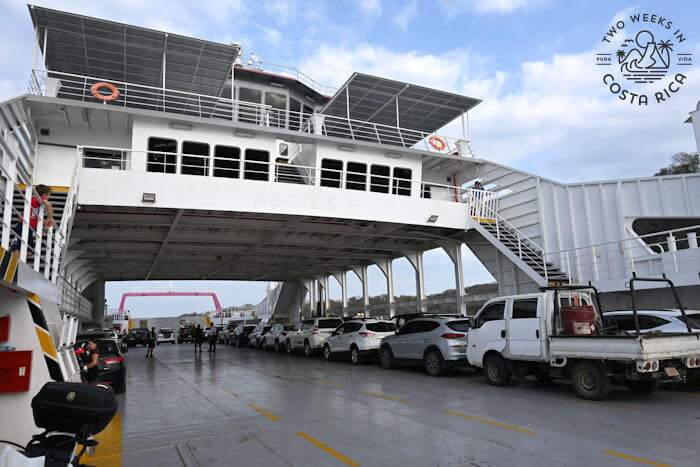
IMPORTANT BRIDGE CLOSURE
La Amistad Bridge (also known as the Tempisque River Bridge), which connects Highway 1 to the Nicoya Peninsula via Route 18, will be closed for maintenance starting on April 1, 2024.
This closure will impact the drive from San Jose or the central Pacific coast to Guanacaste. The main tourist destinations affected are Nosara, Samara, and Punta Islita.
Construction is expected to last from April until July 2024, but it could take longer.
If you are visiting a destination impacted by this closure, we highly recommend taking the Puntarenas-Naranjo ferry. This will let you cut over to the northern Nicoya Peninsula and then continue the drive up Route 21 to get to Guanacaste. The only other option than taking the ferry is to drive all the way north to Liberia and then around.
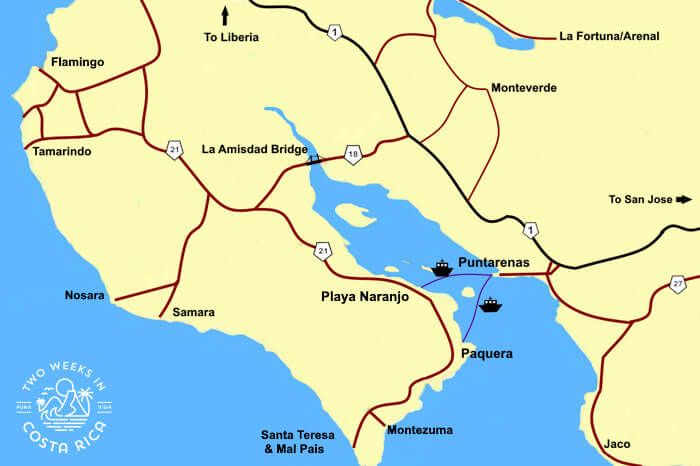
For northern Guanacaste destinations like Tamarindo, Playa Flamingo, Playa Conchal, Playa Hermosa, Playas del Coco, etc., it makes the most sense to skip the ferry and take Highway 1 the whole way. Of course, if you’d like to do the ferry, it is an option.
Puntarenas-Naranjo Ferry Schedule
As of April 1, 2024, the ferry departs ten times a day.
Below is the current schedule. Plan to arrive 30-40 minutes in advance to get your car in line.
Puntarenas to Playa Naranjo: 3:30 a.m., 5:30 a.m., 7:30 a.m., 9:30 a.m., 11:30 p.m., 1:30 p.m., 3:30 p.m., 5:30 p.m., 7:30 p.m., 9:30 p.m.
Playa Naranjo to Puntarenas: 3:30 a.m., 5:30 a.m., 7:30 a.m., 9:30 a.m., 11:30 p.m., 1:30 p.m., 3:30 p.m., 5:30 p.m., 7:30 p.m., 9:30 p.m.
*The ferry does not operate on Holy Friday/Viernes Santo (Friday before Easter). It is open every other day of the year.
Buying Tickets
Online Tickets
Tickets for the Puntarenas-Naranjo ferry can be purchased in advance through the ferry company’s website, Coonatramar.com.
Their website is available in Spanish and English. To change to English, select the flag symbol at the top.
To purchase tickets, you will need to create an account with Special Ticket, their online ticketing system. You will need to enter your name, email, phone number, and document (passport), and make a password.
Once signed in, you can return to the homepage and click Comprar Tiquete for the corresponding ferry route you need (Puntarenas to Naranjo or Naranjo to Puntarenas).
On the next screen, you will choose how many adults, children, and the type of vehicle you plan to bring on the ferry. If you are crossing with a car or SUV, you will need to select Vehículo Liviano. They also will ask for the license plate number (placa). If you are renting a car and do not have this information yet, you can type “rented” or “alquilar” in that space.
The next screen is where you will select the date from a calendar. At the time of this writing, tickets were only available 30 days in advance.
Finally, you will come to the payment page. Here, you will have to add a credit card (Agregar tarjeta). Then select the credit card as your payment method.
After paying, a ticket confirmation with QR code will be sent by email.
In Person Tickets
Tickets also can be purchased in person at the ferry company’s office near the docks in Puntarenas and Naranjo. This is more of a risk, though, because they may sell out.
The ticket office in Puntarenas is located across the street from the dock. Look for the sign that says Coonatramar. In Naranjo, there is a ticket window in the small ferry terminal building.
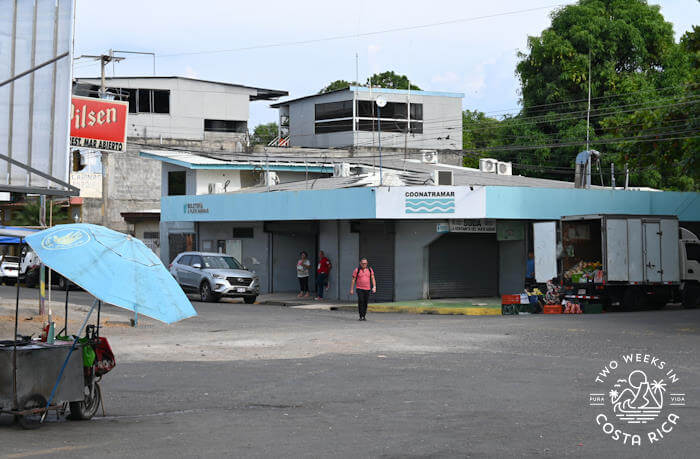
Ticket Prices
Adults: ₡1,005 (about $2 USD)
Children (under 12): ₡600 (about $1)
Regular Sized Vehicle: ₡10,170 (about $20)
Motorcycle/AVT/Quad: ₡6,780 (about $13)
Bicycle: ₡2,260 (about $4)
Boarding the Ferry
Using the Puntarenas-Naranjo ferry is a straightforward process. With your tickets purchased online, you just need to arrive at the dock early (they recommend 40 minutes before departure) to load onto the boat.
Here is the map location for the Puntarenas dock: MAP
Here is the map location for the Naranjo dock: MAP
Boarding the Ferry with a Car
If you plan to take your car across, the process is the same whether you are departing from Puntarenas or Naranjo.
Getting in Line
First, you’ll arrive at the dock and get your car in line. An employee will come and ask for your ticket confirmation and QR code. They may put a laminated ticket on your dashboard, saying that they have reviewed your details.
The line starts right at the ferry dock and then curves onto the street. If you are unsure where to go, find an employee to ask.
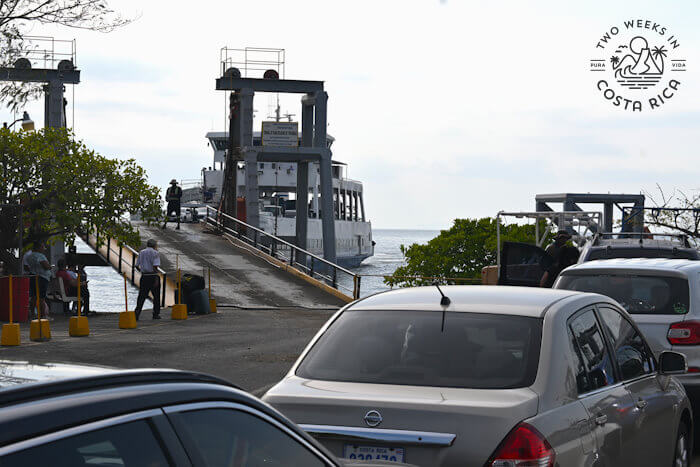
Driving Onto the Boat
Once the ferry arrives and is unloaded, they will start directing cars to drive on.
Important: At this point, any passengers in the car should get out and walk onto the ferry. Only the driver is allowed to drive on and off. If you are a single adult traveling with minors or elderly people, they will make an exception.
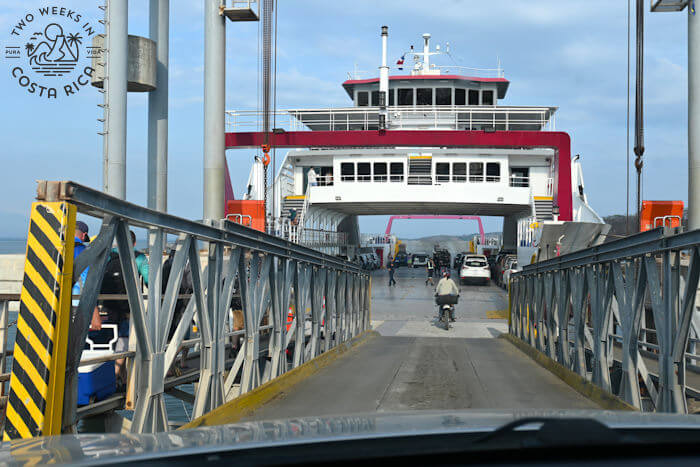
Parking on the Ferry
After driving up the ramps onto the ship, more employees will wave you into a spot. They pack in the cars and trucks very tightly.
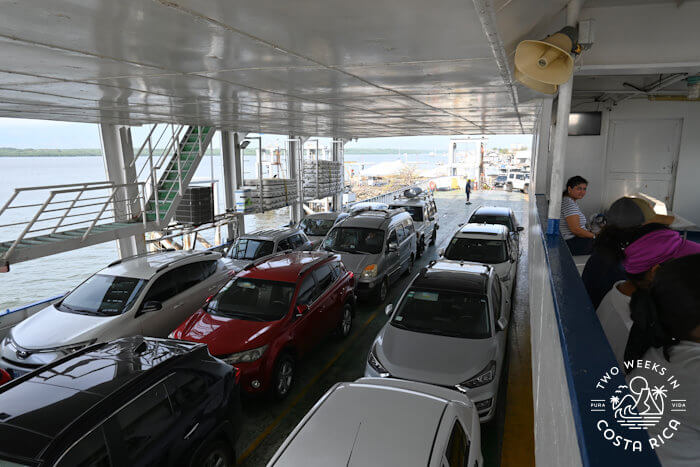
Once parked, you will exit your vehicle and find the stairs to the upper decks. Parking on the ferry is fairly secure since people are not supposed to walk around the car deck once the boat is moving. Still, we recommend keeping your most valuable items with you in a smaller bag.
Walking On
For those walking on, there is a sidewalk and ramp onto the ship. It will bring you onto the main deck. It would be handy to have a copy of the ticket confirmation to show anyone who asks.
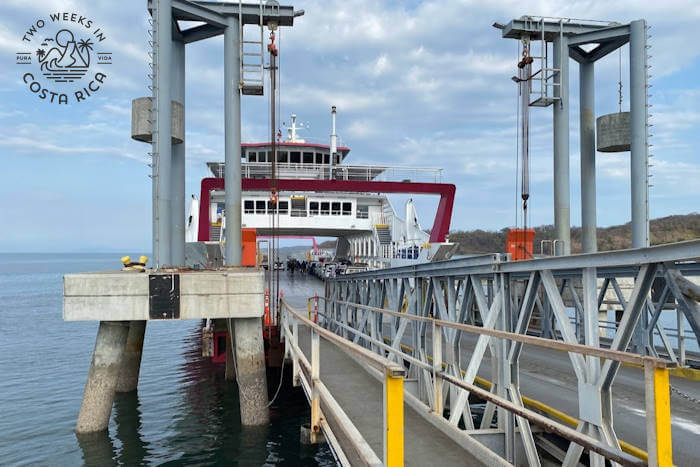
Ferry Ride
The ferry ride between Puntarenas and Naranjo or visa-versa is about 1 hour and 15 minutes. During this time, you can relax and enjoy the beautiful scenery.
Along the way, you will pass small offshore islands, fishing boats, and may even see some cool birds or sea life.
On one of our trips, we saw a pod of dolphins jumping. There are also whales, sea turtles, and manta rays that live in the Gulf of Nicoya.
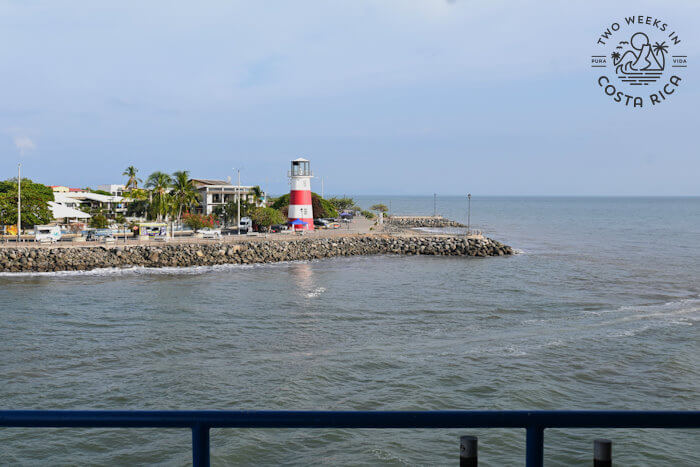
Ferry Amenities
There are two different boats in use for the Puntarenas-Naranjo service.
The San Lucas II is an older boat that works well but is cosmetically more run down. The lower enclosed deck smells a little musty and the boat shows signs of wear.
The San Lucas III is the newer option (from 2024) and has a nice, modern feel.
Which boat you get depends on the schedule as both continuously go back and forth. You will be able to see the boat options when you buy tickets online.
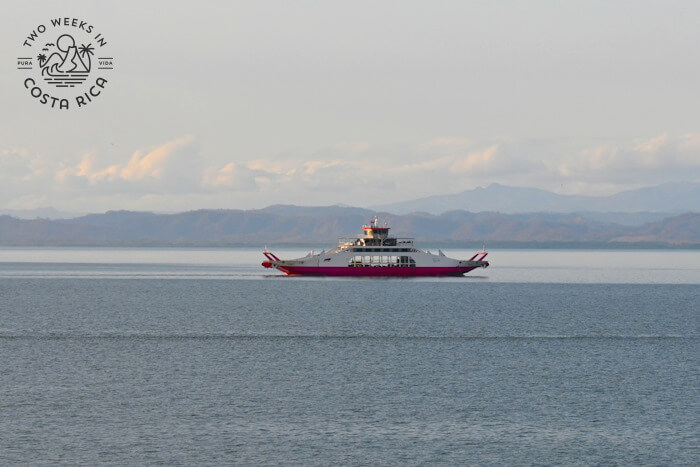
Indoor/Outdoor Spaces
Both boats have two levels for passengers and plenty of places to sit. Each has an air-conditioned indoor sitting area as well. The San Lucas II has this area in the bottom of the boat (under the cars), while the San Lucas III’s airconditioned area is on the second floor, above the cars.
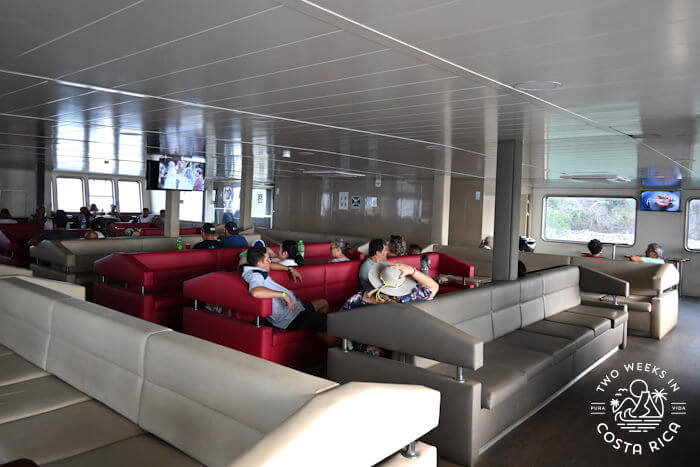
Both ferries have a big top deck with outdoor seating. There is a roof overhead, but it can still be sunny and windy depending on where you sit. They usually have Latin music playing in the outside areas, which can be really fun.
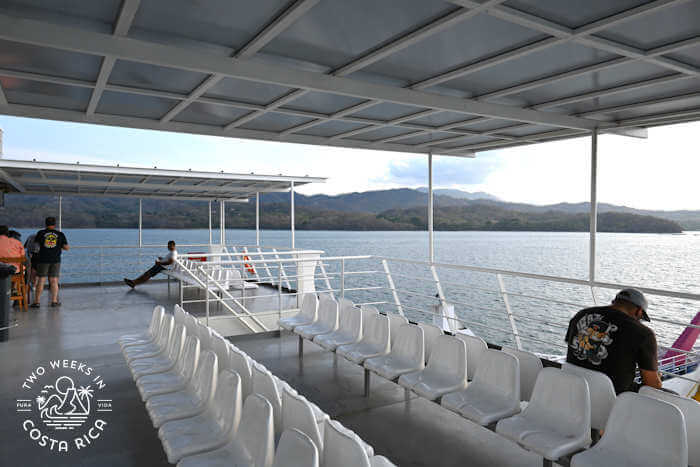
Food & Drinks Onboard
Both boats have small snack bars that sell chips, cookies, some baked goods, simple sandwiches, fried chicken, and French fries. There are also soft drinks, juices, and coffee.
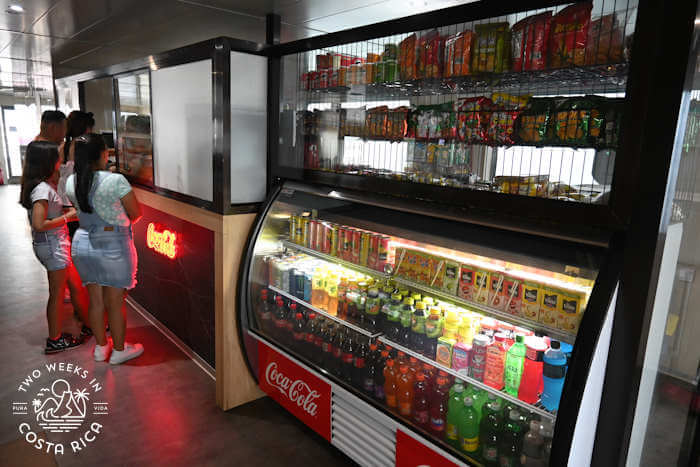
Each boat also has a wet bar on the top deck where you can buy beer, wine, soft drinks, and even mixed drinks or shots.
Deboarding
As the boat approaches its destination, an announcement will be made (in Spanish) to tell drivers to report to their cars. Passengers will need to wait and walk off the boat. This process is quick so be ready to jump in your car and go.
Accessibility
The ferry has stairs between decks. There is a chair lift on the San Lucas II and an elevator on the San Lucas III for passengers with limited mobility.
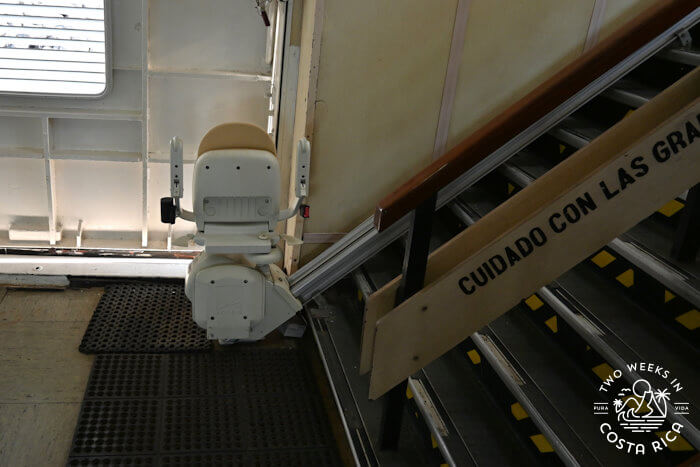
Nearby Accommodations
If you have an early or late ferry and are looking for a place to stay in Naranjo, we recommend OPacifico Boutique Hotel.
This small hotel has 10 or so comfortable, contemporary rooms with A/C. The best part of the hotel is its beachfront location. The property is right on the calm bay and has tables and lounge chairs set up only feet from the sand. They also have a couple of large pools and a nice onsite restaurant. Our family really enjoyed our stay here. $200-300/night. Check Rates and Availability Here.
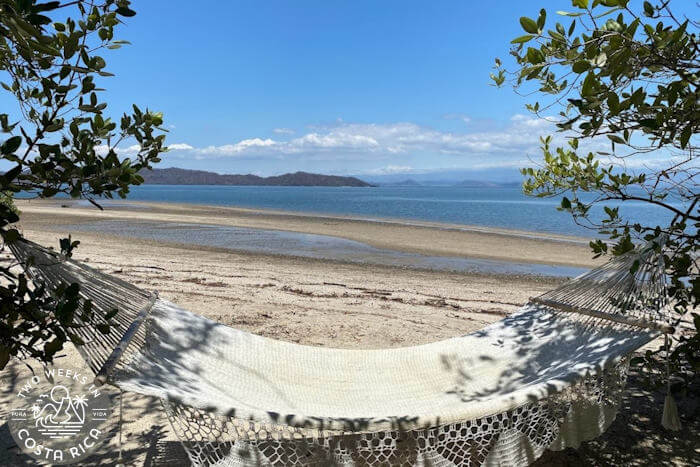
Conclusion
Taking the Puntarenas-Naranjo ferry is a good way to break up a long travel day. If you are taking your car, you can leave most of your belongings below while you enjoy the views from the top deck or sip a drink in the A/C.
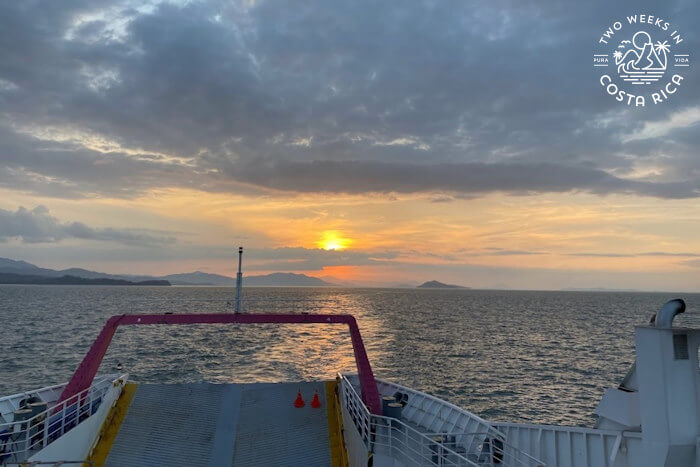
Last Updated: April 12, 2024
Have a question about using the ferry between Puntarenas and Playa Naranjo? Leave a comment below.
Looking for more information to help you plan your trip? Check out these posts:
Rental Car Discount – Our readers get 10% off with one of the most reliable rental car companies, plus free extras.
Rainy Season Driving in Costa Rica – Since it’s in the tropics, Costa Rica gets a lot of rain but you can be prepared knowing what to expect.
Packing for Costa Rica: The Essentials – This post lists some necessary items and other things that can make your travels more comfortable.
